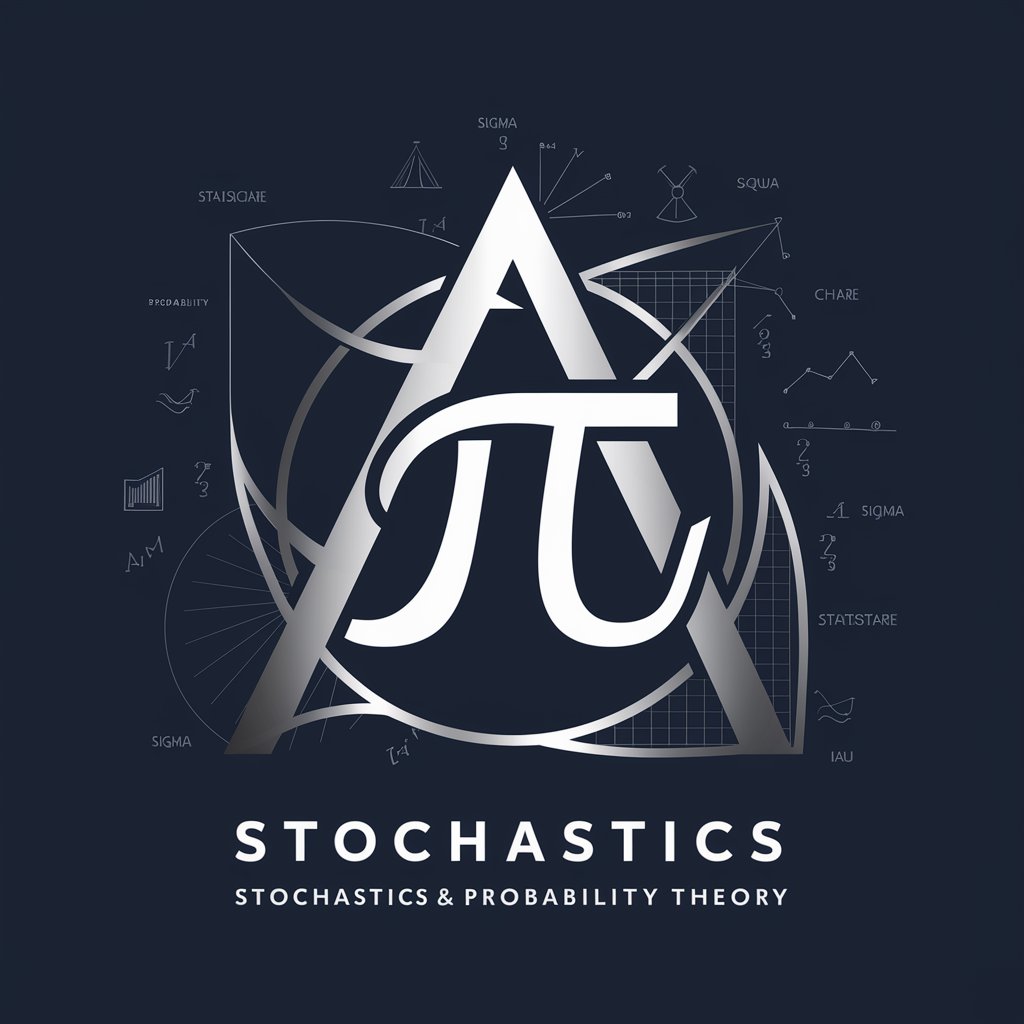Stochastic Processes - Stochastic Modeling Tool

Welcome to Stochastic Guide!
AI-powered Stochastic Process Simulation
Explain the concept of Markov chains and their applications.
Describe the branching process and its significance in probability theory.
How does the Poisson process model random events in time?
What are the key properties of martingales in stochastic processes?
Get Embed Code
Introduction to Stochastic Processes
Stochastic processes are mathematical models used to describe systems or phenomena that evolve over time under the influence of random factors. They are fundamental in various fields such as finance, telecommunications, queueing theory, and physics, offering a framework to analyze the randomness in dynamic systems. A classic example is the Random Walk, which models the path of a molecule as it travels in a liquid or a gas, or the fluctuation of stock prices over time. Another scenario illustrating a stochastic process is weather forecasting, where the future state (e.g., temperature, precipitation) depends on both its current state and some degree of randomness. Powered by ChatGPT-4o。

Main Functions of Stochastic Processes
Modeling Random Behavior Over Time
Example
The Wiener Process (Brownian motion) is a foundational model for stochastic processes. It's used in finance to model stock prices in the Black-Scholes model, representing continuous-time stochastic processes where each movement is random and independent of past movements.
Scenario
In finance, to predict future stock prices and manage risk in options pricing.
Analyzing Queueing Systems
Example
The Poisson process is used to model the number of events happening within a fixed period. This process is fundamental in queueing theory, where it helps calculate the probability of a certain number of customers arriving at a service center within a given time frame.
Scenario
In telecommunications, to design networks that efficiently handle varying volumes of calls or data packets.
Predicting Reliability and Failure Times
Example
The Exponential Distribution, associated with the Poisson process, models the time between events in a process where events occur continuously and independently at a constant rate.
Scenario
In engineering, to predict the failure times of components or systems and schedule maintenance for minimizing downtime.
Ideal Users of Stochastic Processes
Financial Analysts and Economists
These professionals use stochastic processes to model financial markets, evaluate risks, and inform investment decisions. The inherent randomness in market behavior makes stochastic models ideal for predicting future price movements and volatility.
Telecommunications Engineers
In designing and managing communication networks, engineers use stochastic models to understand and predict traffic patterns, ensuring quality service while optimizing the use of network resources.
Operations Researchers
These users apply stochastic processes in logistics, supply chain management, and service industry operations to optimize resource allocation, improve efficiency, and reduce waiting times in systems with uncertain demand.
Environmental Scientists
Stochastic processes help model complex environmental systems affected by random factors, such as climate change patterns, to improve prediction accuracy and develop strategies for mitigation and adaptation.

Guide to Using Stochastic Processes
Step 1
Visit yeschat.ai for a free trial without login, also no need for ChatGPT Plus.
Step 2
Understand the basics of probability theory and stochastic processes, including concepts like random variables, probability distributions, and Markov chains.
Step 3
Identify the specific type of stochastic process applicable to your problem, such as Poisson processes for event modeling or Brownian motion for financial modeling.
Step 4
Utilize computational tools and software to simulate and analyze the stochastic processes, tailoring them to your specific use-case.
Step 5
Regularly review and update your models based on new data or changing parameters to ensure accuracy and relevance.
Try other advanced and practical GPTs
Stochastics Expert
Demystifying stochastics with AI

Advanced Computing Stochastic Calculus Tutor
AI-powered Stochastic Calculus Expertise

Stochastic Scholar
Demystifying stochastic processes with AI

Stochastic Differential Equations GPT Lecturer
Master Stochastic Equations with AI

SIG
Transform Text into Visual Artistry

Stochastic Guide
Demystifying Stochastic Processes with AI

SOS Rupture
Navigate separations with AI precision

Accessibility Ally
Empower Accessibility with AI

Accessibility Helper
Empowering digital inclusivity with AI

Online Course Sales Funnel Guru
Optimize Your Course Funnel, Maximize Enrollment

Sales Funnels Guide
Build and optimize sales funnels effortlessly.

AdMaster Pro
Empower Your Ads with AI

Q&A About Stochastic Processes
What are stochastic processes used for?
Stochastic processes are used in various fields like finance for modeling stock prices, in telecommunications for traffic modeling, and in natural sciences for simulating random phenomena.
How does a Markov chain differ from other stochastic processes?
A Markov chain is a specific type of stochastic process where the future state depends only on the current state and not on the sequence of events that preceded it.
Can stochastic processes predict exact outcomes?
No, stochastic processes cannot predict exact outcomes. They provide probabilistic models to understand and predict the behavior of systems that exhibit randomness.
What are common challenges in working with stochastic processes?
Common challenges include determining the right model for a process, computational complexity in modeling and simulating, and ensuring model assumptions are valid.
How important are initial conditions in stochastic processes?
Initial conditions are crucial as they can significantly influence the behavior and the output of the stochastic model, particularly in non-linear and complex processes.
